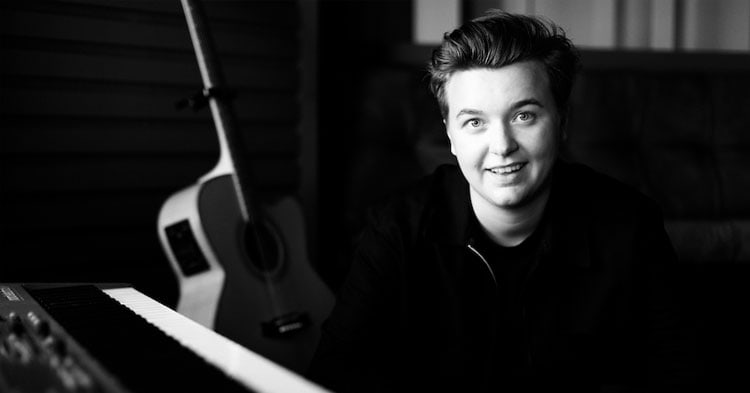新兴的词曲创作人和制作人Kerstin Ljungström发现了录音室校正软件在实现她备受赞誉的音效中的强大力量
2021年9月30日

当知名音乐家、词曲创作人和制作人Kerstin Ljungström为工作前往她的故乡瑞典以外的地方时,她说她有时感觉自己是房间里最无聊的人。这位2020年Denniz Pop Awards最佳新进词曲创作人/制作人奖的决赛选手追求艺术的简洁性和清晰性。
“我喜欢一首歌从头到尾都很清晰,”她解释道。“如果你正在创作一段歌词,不要有16种不同的旋律,因为当有人听的时候,他们想知道自己听到了什么。他们想要识别旋律。”
她的这种方法,加上取之不尽的才华,使这位24岁的年轻人成为全球最具活力和成功的音乐圈中的一颗新星。自从被发现并在瑞典著名的Musikmakarna学校学习以来,Ljungström已经与行业内的大师如Salem Al Fakir、Vincent Pontare和Magnus Lidehäll合作。讽刺的是,她最早的一部作品是2019年的热门歌曲《Complicated》,由Alexander Oscar和SVEA演唱。她目前与环球音乐出版签约。
“我通常在不在瑞典时的对话是,‘我们如何能做到简单,但又有趣呢?’”Ljungström说。“在瑞典,人们在这一点上异常出色,这就是为什么瑞典产生了如此多伟大的音乐。”
发现音乐制作
当Ljungström在14岁学会弹吉他时,她就开始在乐队中演出并创作歌曲。尽管她当时并不知道制作是什么,但她迅速被音乐的结构和编排过程所吸引。“我当时不能打鼓,”她说,“但我还是会问,‘你能这样打鼓吗?’”
她购买的第一张CD是Justin Timberlake的《FutureSex/LoveSounds》,这对她产生了深远的影响。
“那张专辑真的让我感到振奋,我现在知道那是因为制作的原因,”Ljungström说。“伟大的制作人总是在努力推动音乐创作的界限,我觉得这非常鼓舞人心。”
她很幸运地在一个让她能够舒适地玩弄技术的环境中成长。她的母亲嫁给了一位计算机技术员,他在家中保留了一个小房间,用于构建和调试系统。当Ljungström在斯德哥尔摩的Studio Gottefar开始实习时,她已经在实践中学习。

“他帮助我与计算机和技术建立了联系,让我明白这些东西并不可怕,”Ljungström说。“在录音室里,我只需转动每一个旋钮,看看会发生什么。什么也不会爆炸。这是一种很好的学习方式。”
优化录音室音效
Ljungström目前的录音室很小,但设计合理——配有ATC监听音箱、Universal Audio接口和各种合成器。“我喜欢音乐响亮的感觉,我也喜欢合成器,”她说。
她特别喜欢Shure SM7B麦克风,部分原因是她可以在空间中移动它。“对我来说,总是觉得在录制人声时身体必须超级僵硬是很奇怪的,因为在其他任何时候你都不会这样唱,”她解释道。“所以我喜欢当某人可以坐在沙发上拿着麦克风,想站起来就站起来,或者靠在角落里唱歌。”
本着“通过实践来尝试”的精神,一位朋友最近向Ljungström介绍了Dirac Live房间校正软件,这是一种最小化房间对制作人所需音效影响的工具,并且确保最佳声学表现,而无需昂贵的处理。
“我对它的工作原理非常感兴趣,”她说。“我确实无法理解如何跟踪声音在房间中的移动,但后来我得以尝试。”
当Ljungström第一次在她的录音室尝试Dirac Live时,她能够识别出房间EQ频谱中一个先前未知的3kHz的缺失,令她感到震惊。“我在这个房间待了那么多年,一直认为它是如此平坦和严格,”她说。“最初,通过软件改变房间声音的体验感觉很奇怪。”
通过使用麦克风分析录音室及其音频系统,Dirac Live房间校正通过专利的脉冲响应和频率响应校正算法改善录音室声学,并提高声音再现的准确性。
“从那时起,我每天都在使用Dirac Live,”Ljungström说。“这太神奇了,因为我现在可以看到我的混音效果理解得更好了。今天我的混音因为使用Dirac Live而变得更好,因为房间EQ中的那个小缺口,我之前根本不知道它的存在。”
全球合作
随着COVID-19疫情的减退,Ljungström期待着与远方艺术家的合作,将Dirac Live带到现场,复制她在斯德哥尔摩精心完善的音效。
“并不是每个人都有一个声学效果出色的录音室。能够去伦敦、美国或哥本哈根而不必担心录音室的情况,这太聪明了,”她说。“我会在一天开始时放好麦克风,分析房间,并识别出我在自己录音室中听到的声音。”
Ljungström目前正在与歌手/词曲创作人SHY Martin合作一系列歌曲,她表示结果非常出色。她也在为自己的瑞典语专辑而努力,该专辑预计于2022年发布,单曲暂定在这个秋天推出。
“再次转换角色会很有趣,”Ljungström说。“这几年来让我更加尊重艺术家。他们在追寻梦想上付出了如此多的时间和精力。”
对于Ljungström来说,音乐事业的成功完全在于努力。她回忆起当她还是实习生时,Magnus Lidehäll曾把她叫到一边,告诉她,成功的关键并不是最优秀的制作人和音乐家,而是那些最渴望成功的人。
“每个人都很优秀,”Ljungström说。“重要的是谁想要努力工作,谁更专注,愿意投入时间?不要把任何事情视为理所当然,因为这真的很有趣。这一点也不无聊。”